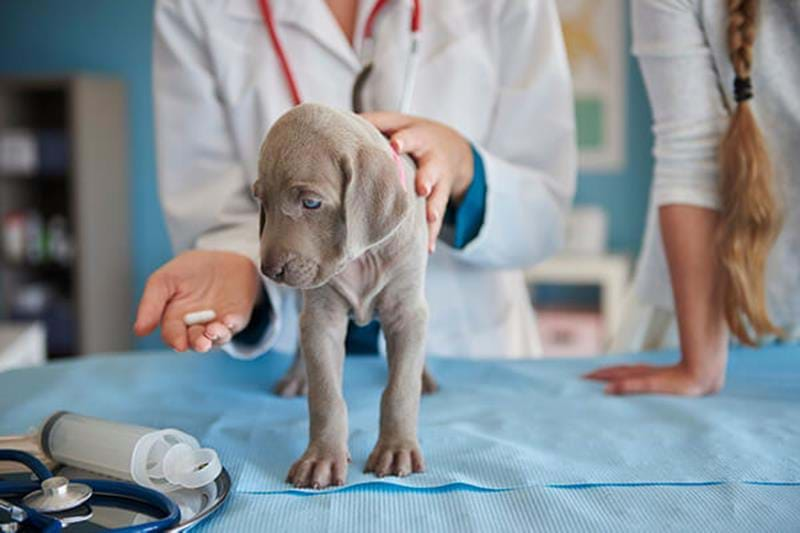By vaccinating your dog, you prevent unnecessary illnesses and limit their spread. A puppy is usually vaccinated just before it is collected from the breeder, but after that, it’s the new owner’s responsibility to vaccinate his or her dog. For show and competition dogs, there are special rules that must be followed for the dog to participate, and if you want to travel abroad with your dog, you must find out what rules apply when entering and leaving.
VACCINATE YOUR DOG AGAINST PARVOVIRUS, CANINE DISTEMPER AND HEPATITIS
Your dog’s first vaccination is already given when it is a puppy. Dogs should receive the first dose of vaccine against parvovirus, canine distemper and hepatitis when they are around seven to eight weeks old. Since puppies should not leave their mother before they are eight weeks old, the breeder normally takes care of vaccinating the puppy. It must be stated in the purchase agreement that the puppy is vaccinated. In addition, a vaccination certificate from the veterinarian must be provided at the time of purchase. If for some reason the breeder has not vaccinated the puppy at weight weeks of age, it is the new owner’s responsibility to ensure that it is done as soon as possible. The vaccine should then be renewed when your dog is 12 weeks and one year old. In order to have adequate protection, your dog have to be vaccinated at regular intervals. The recommended interval for vaccinating your dog is every three years. Vaccinating against parvovirus, canine distemper and hepatitis is particularly important if your dog spends time in places and environments where there are many other dogs, for example in dog parks or at shows and competitions.
PARVOVIRUS IN DOGS
Parvovirus (commonly known as parvo) mainly affects dogs and is highly contagious. Puppies are especially vulnerable. Typical symptoms include high fever, vomiting and diarrhea. Parvovirus is excreted via the dog’s feces and can survive in a so-called infectious form both indoors and outdoors for a long time. Due to the high vaccination rate, parvovirus is rarely occurring in dogs in Sweden.
CANINE DISTEMPER IN DOGS
Distemper mainly affects young dogs between 2 and 18 months. The virus occurs in secretions from the nose and ears and is transmitted either directly from dog to dog or indirectly through people and objects. The disease begins with high fever, lethargy and poor appetite. Later symptoms include vomiting, diarrhea, discharge from the eyes, severe cough and rash with pus-filled blisters. Sometimes the nervous system is also affected. Vaccinating your puppy at an early age is therefore important. Due to the high vaccination rate, distemper is rarely occurring in dogs in Sweden.
HEPATITIS IN DOGS
Vaccinate your dog against hepatitis. Infectious hepatitis in dogs (HCC, hepatitis contagiosa canis) is caused by a virus that spreads through various body fluids. Common symptoms are diarrhea, nausea and abdominal pain that make the dog not want to move. The mucous membranes in the mouth and eyes may be pale and/or yellow. Bleeding and swelling in the neck, head or body are also common. Severe eye inflammation often develops. However, some contagious dogs show no symptoms at all. Due to the high vaccination rate, only a few cases of infectious hepatitis occur in Sweden each year.
VACCINATE YOUR DOG AGAINST KENNEL COUGH
Kennel cough is a collective name for symptoms similar to whooping cough in dogs. A typical symptom is acute onset cough attacks that sometimes lead to nausea or the dog coughing up white mucus. Short fever peaks may also occur. Dogs living in environment with many other dogs should be vaccinated against kennel cough annually. Although the disease is not directly life-threatening, it is extremely difficult for the dog and also very contagious. The vaccine does not protect against all types of infectious agents that can cause kennel cough, but vaccinating your dog reduces the risk of it getting infected, and it also makes the symptoms much milder.
VACCINATING COMPETITION DOGS
For dogs that participate in competitions, tests and/or shows, there are special rules that must be followed for the dog to participate. More information can be found in the Swedish Kennel Club’s Show and Championship Rules, section General rules for shows, tests and competitions, point 1 Vaccinations.
VACCINATING YOUR DOG WHEN TRAVELING ABROAD
When you travel abroad, it is of the utmost importance to find out what rules apply to vaccinating your dog when entering and leaving in each country. You can contact the country’s embassy for complete information and also consult your veterinarian. Take care of everything in advance! Some vaccines must be taken well in advance. Remember also that in some countries there are diseases that do not exist in Sweden, and that can also infect people.







